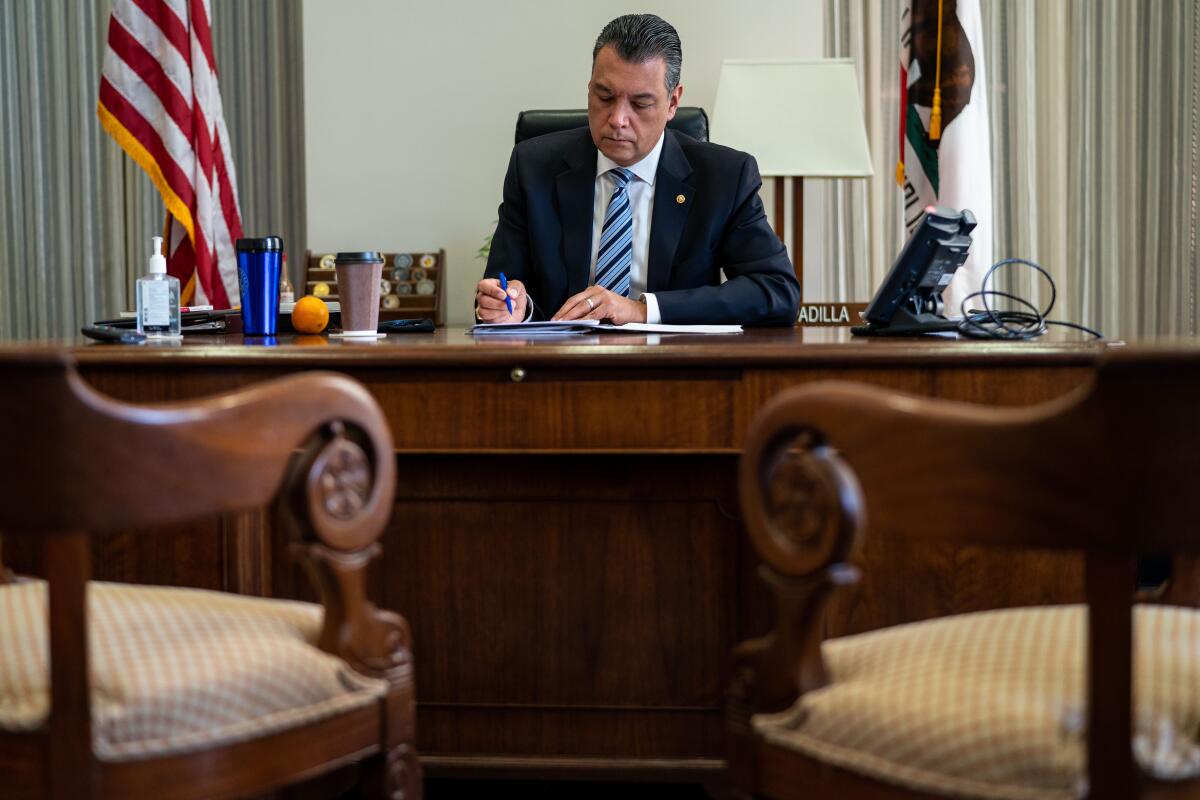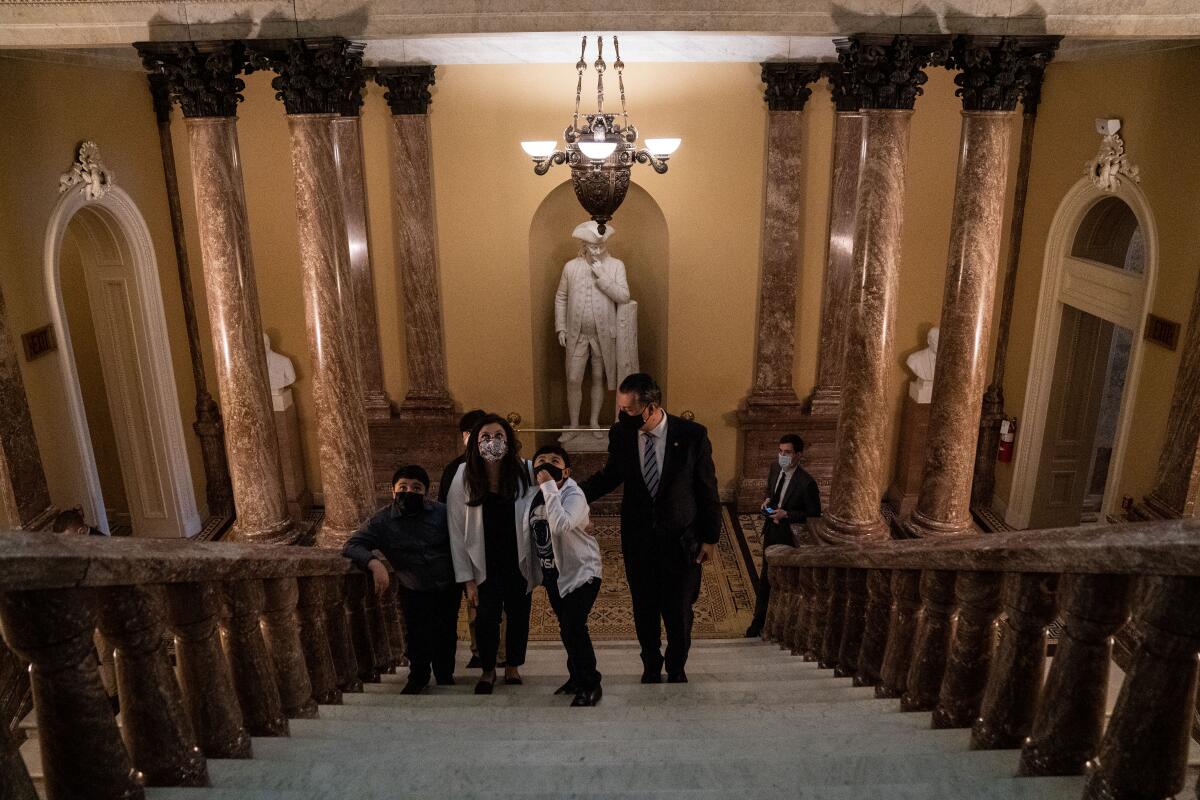Can California’s first Latino senator break Washington’s gridlock on immigration reform?

- Share via
WASHINGTON — Twenty-seven years after Alex Padilla hit the streets with hundreds of thousands of California Latinos to protest the anti-immigrant Proposition 187, he finds himself in a position to help deliver the change he has long sought.
All he has to do is persuade Washington to do something it has been unable to achieve since the Reagan administration: pass a major immigration reform bill.
The first Latino to represent California in the U.S. Senate, Padilla has optimism that legislation is possible under President Biden, who has said that comprehensive immigration reform is a priority, and with Democratic control of the Senate and House.
“No state has more at stake in it than California, and that’s who I represent, so it is a top priority. I come with urgency,” Padilla told The Times in an interview.

But with an evenly divided Senate, anything would need bipartisan support to have a chance of passing — at a time when the two major parties can barely agree on anything.
With all of the media focus and political rhetoric over an increase in immigrants and asylum seekers at the southern border, even Republicans who are interested in changing immigration laws now say they are leery of supporting minor reforms once seen as possible.
Like Biden, Padilla says comprehensive reform is ideal, but piecemeal fixes would be acceptable.
“My preference is however we’re going to be able to get it done,” Padilla said. “It definitely was a priority from the moment the appointment was announced. Updating our immigration laws has been long overdue.”
Padilla’s first bill, called the Citizenship for Essential Workers Act, would provide a pathway to citizenship for over 5 million essential workers in the U.S. illegally who were on the front lines of the pandemic.
Senate leaders gave him the gavel of the subcommittee that will be the first stop for any immigration reform bills, providing him with a high-profile perch on the issue. He wants the panel to focus on citizenship and has renamed it Immigration, Citizenship and Border Safety.

Though not the only first-generation American currently serving in the Senate, Padilla is the only first-generation child of Mexican parents to ever serve. His parents became naturalized citizens after Proposition 187 passed. The other six current Latino senators are either the children of Cuban immigrants or come from families that have lived in the United States for several generations.
Padilla has begun sitting down with his new colleagues to share his experience as the child of immigrants. He stresses how a pathway to citizenship for the 11 million people already in the country illegally is not only moral and humane but also the right thing for the U.S. economy.
“The 100 of us come from different states, different life experiences, different perspectives. Stories like mine, experiences like mine, have not been heard enough throughout the history of the Senate, and that’s part of both my opportunity and responsibility,” Padilla said. “It should be bipartisan, because it’s not just right for immigrants — it’s good for the country. We know that throughout our nation’s history. And it’s good for the economy. I know that it may not be easy, but I think it’s very doable.”
Optimism in Washington, however, is quickly waning for the possibility of a large-scale bill in the next two years. The comprehensive package Biden sent to Congress was quickly shelved.
House Democrats passed bills to provide legal status to hundreds of thousands of people brought to the country illegally as children, so-called Dreamers, and to create a pathway to citizenship for farmworkers and their families. With a 60-vote threshold to pass most bills in the Senate, neither is expected to pass.
“Unfortunately, what’s happening at the border right now is going to inflame people’s emotions a lot, and I think make anything harder to do, which I think is very regrettable,” said Sen. John Cornyn of Texas, the highest-ranking Republican on Padilla’s subcommittee.
Sen. Lindsey Graham (R-S.C.), who this year co-sponsored a bill to provide legal status to Dreamers, said last week that because of the situation at the border, he would not support his own bill if it were brought up for a vote.
“I think it’s going to be really hard to get a bipartisan bill put together on anything that has a legalization component until you stop the flow,” Graham told reporters.
The vast majority of migrants coming to the border are quickly expelled under a Trump-era pandemic policy that Biden has continued.
People who know Padilla remain optimistic that some legislation is possible and that he’ll play a major role in it.
Former colleagues in the state Senate call him a diligent and dogged lawmaker. They describe him as a workhorse rather than an ideologue, saying he dives into details and uses logic and facts to bring opponents to his side, or at minimum, to find common ground.
“He leaned into hard issues,” said Sacramento Mayor Darrell Steinberg, his former state Senate colleague. “That’s Alex.”
State Sen. Maria Elena Durazo of Los Angeles, whose labor union helped Padilla win his first race, said she’s not surprised Padilla would make immigration reform a top priority.
“He knows the struggles of immigrants. He knows the essential role they have played,” she said. “He experienced it. He lived it. His family lived it. His neighbors lived it.”
The chances of passing comprehensive reform may seem slim, but Padilla isn’t the type to give up, said longtime friend Rep. Tony Cárdenas (D-Pacoima).
“Alex Padilla doesn’t see immigration reform as a bill; he sees it as an opportunity for the United States of America to get right with itself,” Cárdenas said.
For Padilla, it’s personal. The son of a short-order cook and a housekeeper in the country on green cards, Padilla returned to Pacoima in 1994 with an engineering degree from MIT to find that his home state was trying to prevent immigrants in the country illegally from receiving basic public services, including education and nonemergency medical care.
Like many young Latinos, he joined the marches and protests against Proposition 187, awoken to the reality of what can happen if people like him aren’t engaged. The proposition passed but was halted by the federal courts.
When it passed, Padilla set aside engineering to immerse himself in California politics in an effort to change the state. He ran the early campaigns of several Latino politicians, including the state Assembly races of Cárdenas and Los Angeles City Councilman Gil Cedillo.
At age 26, Padilla won his own seat on the City Council.
He became the first Latino council president in a century in 2001, was elected to the state Senate in 2006 and became California’s secretary of state in 2014. In December, Gov. Gavin Newsom tapped him to replace Kamala Harris in the U.S. Senate after she was elected vice president.
Cedillo sees Padilla’s rise as part of the fruits of that hard battle over Proposition 187 and the anti-immigrant sentiment it represented.
“That war is being won,” Cedillo said. “And he’s the manifestation of that, having him in the U.S. Senate.”
More to Read
Get the L.A. Times Politics newsletter
Deeply reported insights into legislation, politics and policy from Sacramento, Washington and beyond. In your inbox three times per week.
You may occasionally receive promotional content from the Los Angeles Times.











